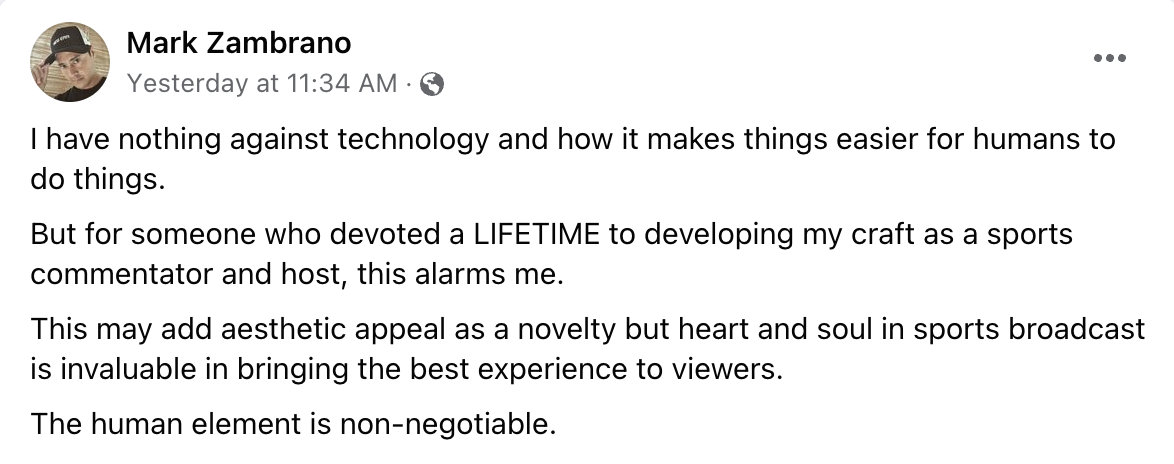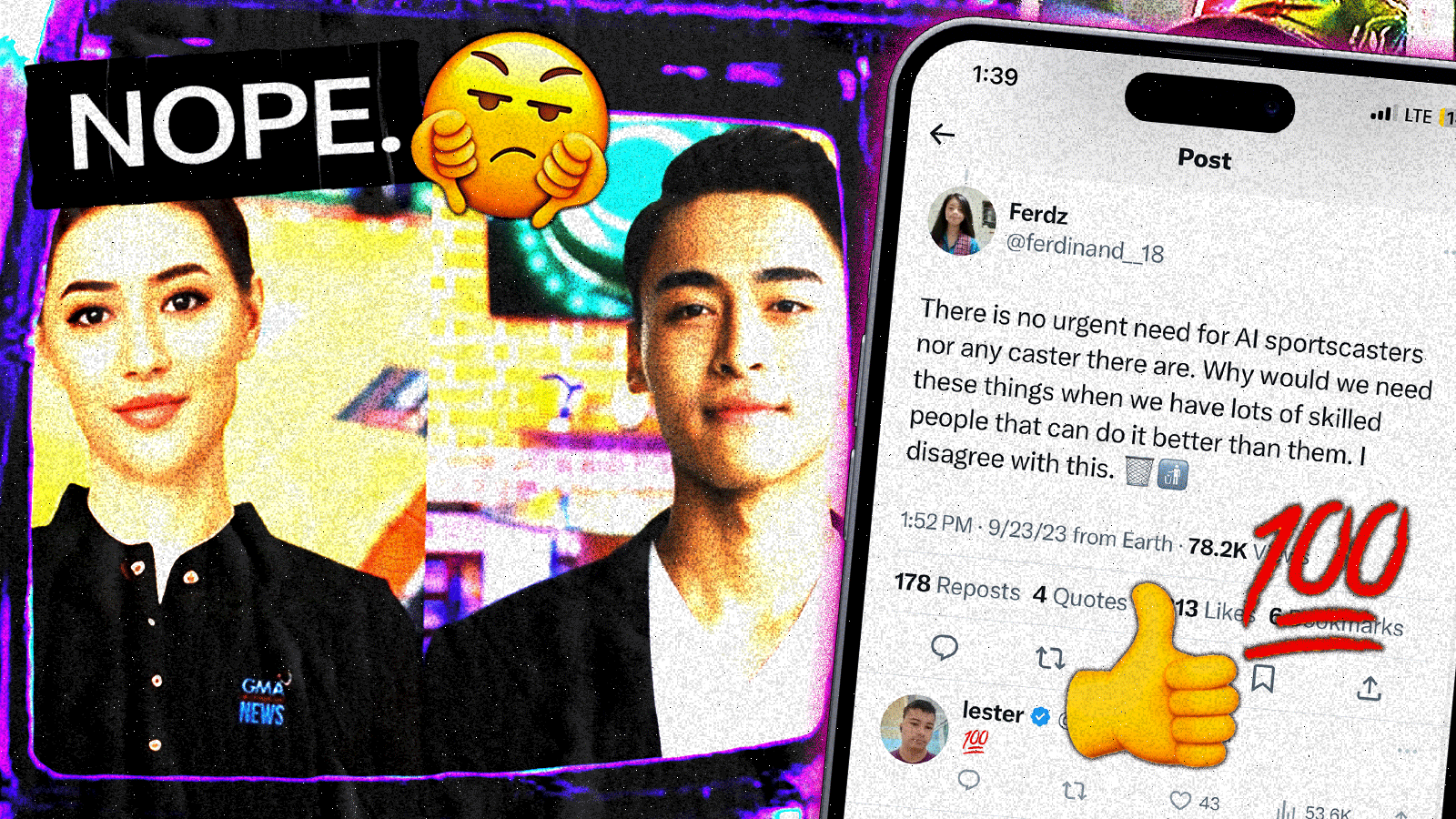GMA Integrated News’ use of artificial intelligence (AI) sportscasters Maia and Marco for the NCAA games sparked a debate on the ethical use of AI and paints a murky future for journalism.
Related: What Viral Game Monopoly GO! Has Taught Me About Humanity
There’s no doubt that artificial intelligence or AI is permeating almost every corner of the world. From classrooms to workplaces, art and media to medicine, you can find AI at use in different ways. Ease, accuracy, automation—there are many opportunities and valid reasons for us to use AI in our daily lives. But the question is—where do we draw the line?
As with any rapid technological development, AI has raised plenty of questions and concerns regarding its use and ethics, such as data privacy, consent, copyright, sustainability, and its impact on employment, among others. AI is the future, but with the way it’s being used, what kind of future are we talking about?
Recently, media giant GMA Integrated News revealed their new sportscasters for the National Collegiate Athletics Association Season 99 games: Maia and Marco, “the Philippines’ first AI Sportscasters.” Naturally, the announcement garnered mixed reactions—some were impressed at the advancement of technology and the way GMA adapted to the changing times, but most expressed their ire at the thought of artificial intelligence taking over jobs meant for people and the growing concerns regarding the ethical use of AI.
Meet Maia and Marco — the Philippines’ first AI Sportscasters!
— GMA Integrated News (@gmanews) September 24, 2023
Now that #NCAASeason99 has started, they are here to help our courtside reporters by giving updates in sports!
Follow GMA Integrated News, @GMASportsPH , and GMA Synergy on social media for their exclusive reports. pic.twitter.com/CPMFEyyNVJ
AI’S PLACE IN JOURNALISM
With thousands of presenters and journalists—established or aspiring—committed and enthusiastic enough to deliver news and information to the public, why use AI? Is it because AI sportscasters will do a better job than a human being? Well, it’s not that, given that Maia and Marco, like other AI, cannot really capture the range of human emotions and delivery, and has no emotional stake in the stories they tell—which is a vital component in connecting news, information, and stories to people.
Sports commentator Mark Zambrano emphasized the human element in sportscasting as being non-negotiable. There’s no substitute for human authenticity.

Techwire Asia reported that AI reporters have been used in China, India, Indonesia, Taiwan, Kuwait, and Malaysia (in which Astro AWANI’s AI reporter Joon has a remarkably similar face shape and haircut to Marco). However, issues of quality and ethics were also prevalent.
AI writing news reports and stories has also been fraught with problems—they’re robotic, often inaccurate, lacking in anything compelling. They just don’t compare to what people can create directly. AI can’t ask questions the way a person could, connect with the people whose stories they’re writing about, or report in a way that people would relate to. Also, visually speaking, as noted by a user on X, Maia and Marco seem to be leaning towards conventional looks, which further pushes the idea (and stereotypes and bias) that you need to look a certain way in order to make it in the industry.
With the ever-increasing concerns regarding data privacy, misinformation and disinformation, unregulated use of artificial intelligence is dangerous in a newsroom. There’s also the question of transparency, as journalist Regine Cabato brought up. Clearly, while AI is a valuable tool that can be used in journalistic work like transcription, translation, giving of headline or content ideas, and research, the responsibility still falls on humans to do the work of journalism—and we need to recognize that.
ADAPT OR PERISH
“Adapt or perish,” people say. You have to adapt to the changing times or else you’ll get left behind. But would GMA, one of the most established leading news outlets in the Philippines, “perish” if they simply used human sportscasters to cover the NCAA?
Even GMA Network’s Senior Vice President and Head of Integrated News Oliver Amoroso agreed that “Maia and Marco are AI presenters, they are not journalists, they can never replace our seasoned broadcasters and colleagues who are the lifeblood of our organization.”
"Maia and Marco are AI presenters, not journalists; they can't replace our seasoned broadcasters and colleagues who are the heart of our organization." Oliver Victor B. Amoroso, GMA Network's Senior Vice President and Head of Integrated News, Regional TV, and Synergy, emphasized…
— GMA Integrated News (@gmanews) September 24, 2023
Maia and Marco are simply meant to complement human coverage, Amoroso said, so the reason behind their creation lies more in simply wanting to get ahead in terms of the newest technology. But one of the most pertinent lessons in a communication class is that messages can be received in a variety of ways, regardless of intent.
The use of AI reporters sends the message that AI has the potential to do the work done by people. Doing it well is another concern, but what does it mean to journalists and aspiring reporters when companies easily choose to show off AI tech instead of cultivating and championing journalistic talent and skill?
Joel Pablo Salud raised a valuable question: If Maia and Marco are not journalists, as GMA claimed, then why are they in the newsroom?
THERE GOES OUR JOBS?
People can call it an exaggeration—an overreaction, if you will. People will say, ”AI won’t really take your job! It’s just another tool for us to make our lives easier!” Even host and DJ KC Montero jokes, “there goes my job!”
Welp.. there goes my job
— KC Montero 🐴🟢 (@KCMontero) September 24, 2023
But people’s frustrations are founded on reasonable assumptions that companies would prefer artificial intelligence models rather than hire skilled people for a variety of reasons.
In writing and media for example, if you look at available work opportunities or recruitments, you’ll see people asking for “writers” who will use ChatGPT or other AI-powered language models to write content for websites. Another instance: the writers’ and actors’ strike in Hollywood went on longer than it should because studios refused to agree to their employees’ terms—which includes the demand of a regulated use of AI in projects.
Artificial intelligence can’t do the work of humans—but companies keep trying to say it could. Regulation would ensure that AI remains a tool, and not a replacement.
Given that the AI industry is booming, careers in data, development, engineering, and similar fields are increasing in number, and they’re high-paying, too. There’s no shame on anyone pursuing those careers for any reason, but a society that forces people to abandon their dreams and aspirations is one that’s bleak and uncreative. But of course, that problem isn’t confined to AI.
There’s another huge discussion to be had regarding standard wages and equal appreciation of all labor. But with regard to Maia and Marco and the use of AI in journalism, it’s important to be skeptical and ask important questions given the problems that AI can bring to the table—and to the newsroom.
Continue Reading: We Really Should Stop Taking Photos and Videos of Random People in Public





